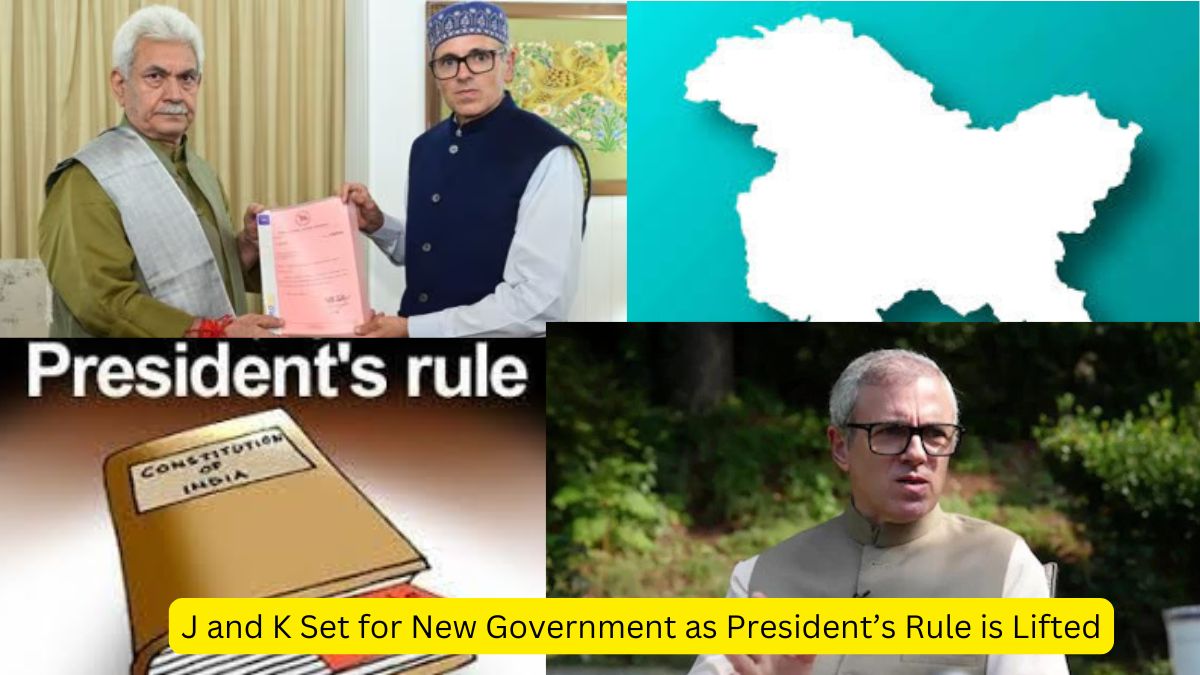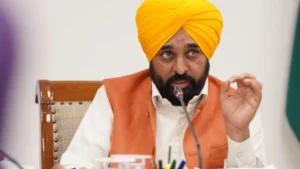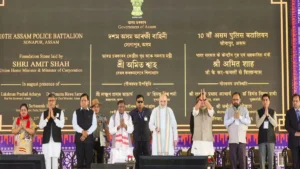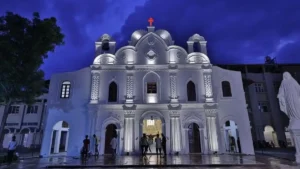The Central Government has officially revoked President’s Rule in Jammu and Kashmir, paving the way for the appointment of a new Chief Minister. In a notification issued by President Droupadi Murmu, the revocation was enacted under the powers granted by the Jammu and Kashmir Reorganisation Act, 2019, and relevant constitutional provisions.
Revocation of President’s Rule
- On October 13, 2024, the President’s Rule in Jammu and Kashmir was officially revoked, clearing the way for the formation of a new government in the Union Territory.
- A gazette notification was issued by the Union Home Ministry, marking a significant political development in the region.
Legal Framework for Revocation
- The revocation was carried out under Section 73 of the Jammu and Kashmir Reorganisation Act, 2019, in conjunction with Articles 239 and 239A of the Constitution of India.
- This move was formalized in an order signed by President Droupadi Murmu, taking effect immediately before the appointment of the Chief Minister.
New Government Formation
- The National Conference (NC)-Congress alliance emerged victorious in the recent Jammu and Kashmir Assembly elections, paving the way for government formation.
- Omar Abdullah, NC Vice President, has been elected as the leader of the alliance and will be the next Chief Minister of Jammu and Kashmir.
Background
Central Rule Imposition (2019)
- President’s Rule was imposed in Jammu and Kashmir on October 31, 2019, following the bifurcation of the erstwhile state into two Union Territories: Jammu and Kashmir, and Ladakh.
- The Jammu and Kashmir Reorganisation Act, 2019, passed on August 5, 2019, facilitated this division.
Article 370 Abrogation
- On the same day, Article 370 of the Constitution, which had accorded special status to Jammu and Kashmir, was abrogated, marking a historic change in the region’s legal and constitutional framework.
Pre-2019 Central Rule
- Before the bifurcation, the central rule had been in place in the erstwhile state since June 2017, following the resignation of then Chief Minister Mehbooba Mufti after the BJP withdrew support from the PDP-led coalition government.
Significance
NC’s Push for Statehood
- The National Conference (NC) has been actively advocating for the restoration of statehood for Jammu and Kashmir, a move bolstered by a Supreme Court judgment supporting their stance.
Timeline of Political Developments
- June 2017: Central rule imposed after BJP pulls out of the coalition with PDP.
- August 5, 2019: Article 370 abrogated, and Jammu and Kashmir Reorganisation Act passed, dividing the state.
- October 31, 2019: Formal bifurcation into the Union Territories of Jammu and Kashmir and Ladakh, leading to President’s Rule in the region.
- October 13, 2024: President’s Rule revoked, enabling the formation of a new government under Omar Abdullah’s leadership.
Article 356 (President Rule)
- As per Article 356 of the Indian Constitution, the President can proclaim President’s Rule in a state, if he/she is satisfied that a situation has arisen in which the government of a State cannot be carried on in accordance with the provisions of the Constitution.
- The President can act either on a report of the Governor of the State or even without the Governor’s report.
Article 239
- (1) Save as otherwise provided by Parliament by law, every Union territory shall be administered by the President acting, to such extent as he thinks fit, through an administrator to be appointed by him with such designation as he may specify.
- (2) Notwithstanding anything contained in Part VI, the President may appoint the Governor of a State as the administrator of an adjoining Union territory, and where a Governor is so appointed, he shall exercise his functions as such administrator independently of his Council of Ministers.
Article 239A
- Creation of local Legislatures or Council of Ministers or both for certain Union territories
| Summary/Static | Details |
| Why in the news? | The Central Government has officially revoked President’s Rule in Jammu and Kashmir, paving the way for the appointment of a new Chief Minister. |
| Legal Framework | – The revocation was carried out under Section 73 of the Jammu and Kashmir Reorganisation Act, 2019.
– It aligns with Articles 239 and 239A of the Indian Constitution. |
| New Government Formation | – The National Conference (NC)-Congress alliance won the Jammu and Kashmir Assembly elections.
– Omar Abdullah, NC Vice President, will be the new Chief Minister. |
| Background | – President’s Rule imposed on October 31, 2019, following the bifurcation of Jammu and Kashmir into Union Territories.
– Article 370 was abrogated on August 5, 2019, removing Jammu and Kashmir’s special status. |
| Constitutional Provisions – | – Article 356: Allows President’s Rule when a state government cannot function as per the Constitution.
– Article 239: Governs administration of Union Territories by the President. – Article 239A: Allows creation of local legislatures or councils for certain Union Territories. |




 Punjab Launches ‘Meri Rasoi’ Scheme: Fre...
Punjab Launches ‘Meri Rasoi’ Scheme: Fre...
 Amit Shah Lays Foundation of 10th Assam ...
Amit Shah Lays Foundation of 10th Assam ...
 475 Year Old Vasai Cathedral Wins UNESCO...
475 Year Old Vasai Cathedral Wins UNESCO...








